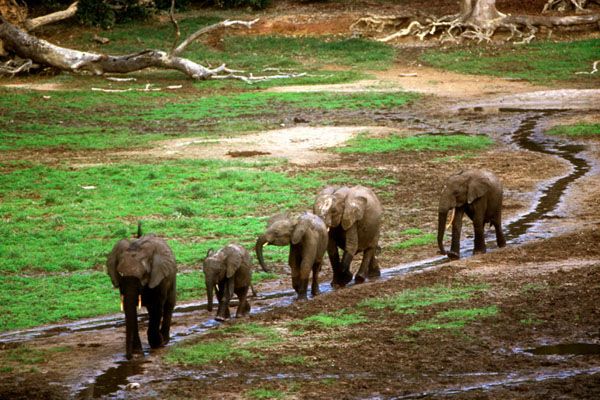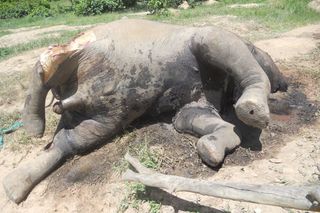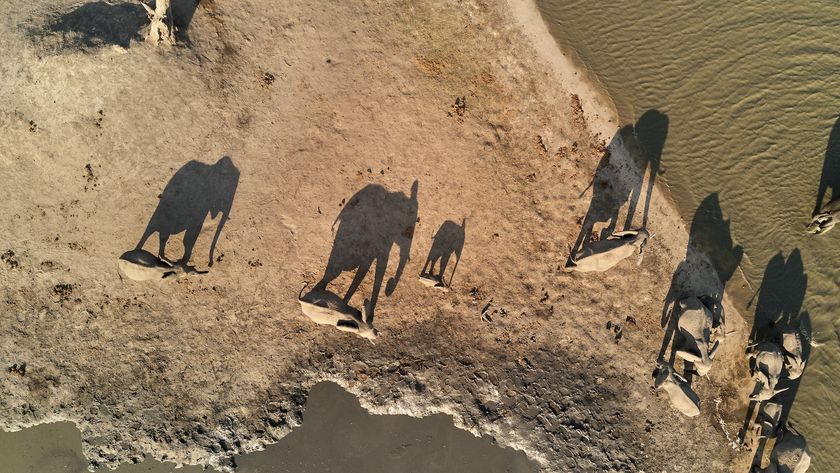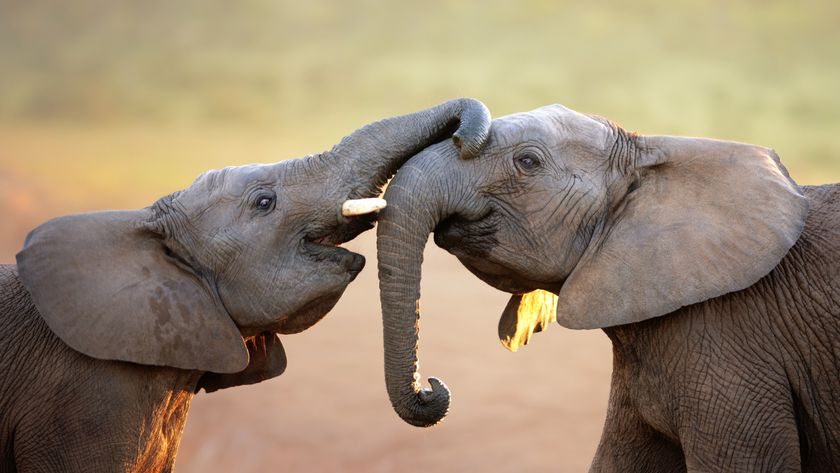
Preventing an Elephant Eden from Becoming Paradise Lost (Op-Ed)

Richard Carroll is vice president for Africa at World Wildlife Fund (WWF) in Washington, D.C. He contributed this article to LiveScience's Expert Voices: Op-Ed & Insights.
Remember that scene from Jurassic Park when the two paleontologists see the herds of living, breathing dinosaurs for the first time? Their eyes widen in disbelief, mouths agape, unable to speak at first.
That's the reaction I had over 30 years ago when I first stepped out of the dense tropical rain forest of Central African Republic's Dzanga-Sangha region into a 30-acre clearing with mineral rich soils known as the "Village of the Elephants." Instantly I was transported into prehistory, with forest elephants of every size, shape and color sucking the mineral salts out of the soil, chasing one another, rolling around in mud-pits and fighting for the best mate or mineral pool. Elsewhere in the clearing, known as the Dzanga Bai, I was awed by bongo, buffalo, sitatunga and hundreds of birds.
This elephant Eden, now a crown jewel in the three-nation Sangha Trinational World Heritage Site, is under attack. Its remote location, combined with effective anti-poaching efforts, have until recently helped it stay out of the severe upswing in poaching across Central Africa. But that isolation is no more: 17 men armed with Kalashnikov rifles recently entered the park and slaughtered at least 26 elephants — four of them calves — collecting as much ivory as possible before disappearing to most likely begin preparing their next attack.
With the help of well-organized criminal syndicates, the ivory is most likely already in transit to Asia to feed the voracious appetite for this "white gold" from newly affluent individuals. What's left of the elephants lies as silent witness to a global crisis. A handful of elephants have since returned, but locals describe the area as an "elephant mortuary." [Elephant Images: The Biggest Beasts on Land]
The threat to stability posed by incidents such as the one at Dzanga Bai is being highlighted today (May 29) in a briefing before the United Nations Security Council. In a report to the world's highest international security body, U.N. Secretary-General Ban Ki-moon says, "Poaching and its potential linkages to other criminal, even terrorist, activities constitute a grave menace to sustainable peace and security in Central Africa."
Unless swift and decisive action is taken, the poachers will most certainly return to the Dzanga Bai. Central African Republic (CAR) has been rocked by violence and chaos since the beginning of the year, and the 17 poachers ominously presented themselves as part of the country's transitional government forces.
Sign up for the Live Science daily newsletter now
Get the world’s most fascinating discoveries delivered straight to your inbox.
Saving the elephants of Dzanga Bai is critical. Central African Republic must act quickly to secure the area and prevent further incursions. Central African Republic's neighbors, Cameroon and Republic of Congo, can also help to ensure the integrity of their shared forests and wildlife. These elephants travel far and carry no passports as they cross international borders throughout the Sangha Trinational. The international community, including the United States, needs to help Central African Republic restore peace and order to safeguard its population and natural heritage.

The U.S. government has achieved much in the past year, including elevating wildlife poaching and trafficking to the highest levels of the State Department. It needs to go further, including a revision of the President's Transnational Organized Crime Strategy to include wildlife crime as a priority on par with other major crimes such as arms smuggling. In addition, the President should work with Congress to ensure that a poaching crisis response bill is introduced by the end of 2013.
However, the long-term solution lies many thousands of miles away, in China and Thailand. The governments of those two countries must better crack down on the ivory markets that are fueling this deadly illegal trade. Forest elephant populations have plummeted 62 percent over the past 10 years, driven largely by demand from newly rich individuals in China and Thailand. The international community should continue pressuring China and Thailand to live up to their obligations under the CITES Convention on International Wildlife Trade in Endangered Species.
Central African Republic has few tourists, and the vast majority travel to Dzanga Sangha, bringing much needed income and exposure to a country little known to the outside world. They also pay to visit the gorillas, and to walk in the forest with Ba'Aka pygmies collecting medicinal herbs.
I often think of Mekema, my trusted Ba'Aka friend and guide, who helped me survey the plants and animals of this area when I first arrived over 30 years ago. Poaching was out of control and the forests were largely empty of species like elephant. But with the help of Mekema and his people, the government of CAR was able to protect Dzanga Sangha and drive out most of the poachers. All of that work threatens to be undone by one swift spasm of violence.
Sadly, Mekema died a few years ago. But he died knowing he had been a part of something good and wholesome in a troubled part of the world. He had helped refill the forest with the majestic wildlife of his youth. I hope for his sake and in his honor that we can once again return the Dzanga Bai to its former state of grace.
The views expressed are those of the author and do not necessarily reflect the views of the publisher. This article was originally published on LiveScience.com .













